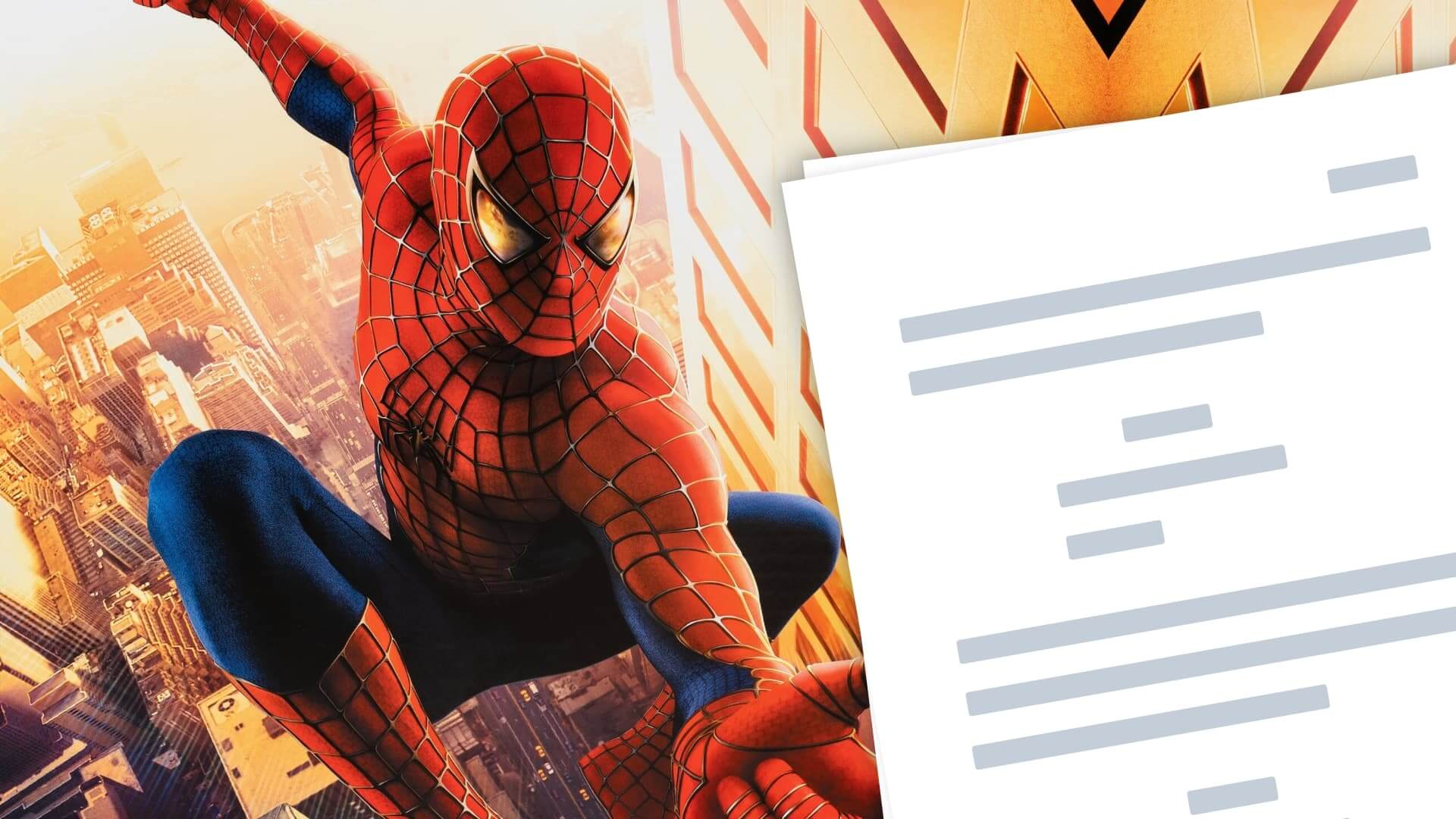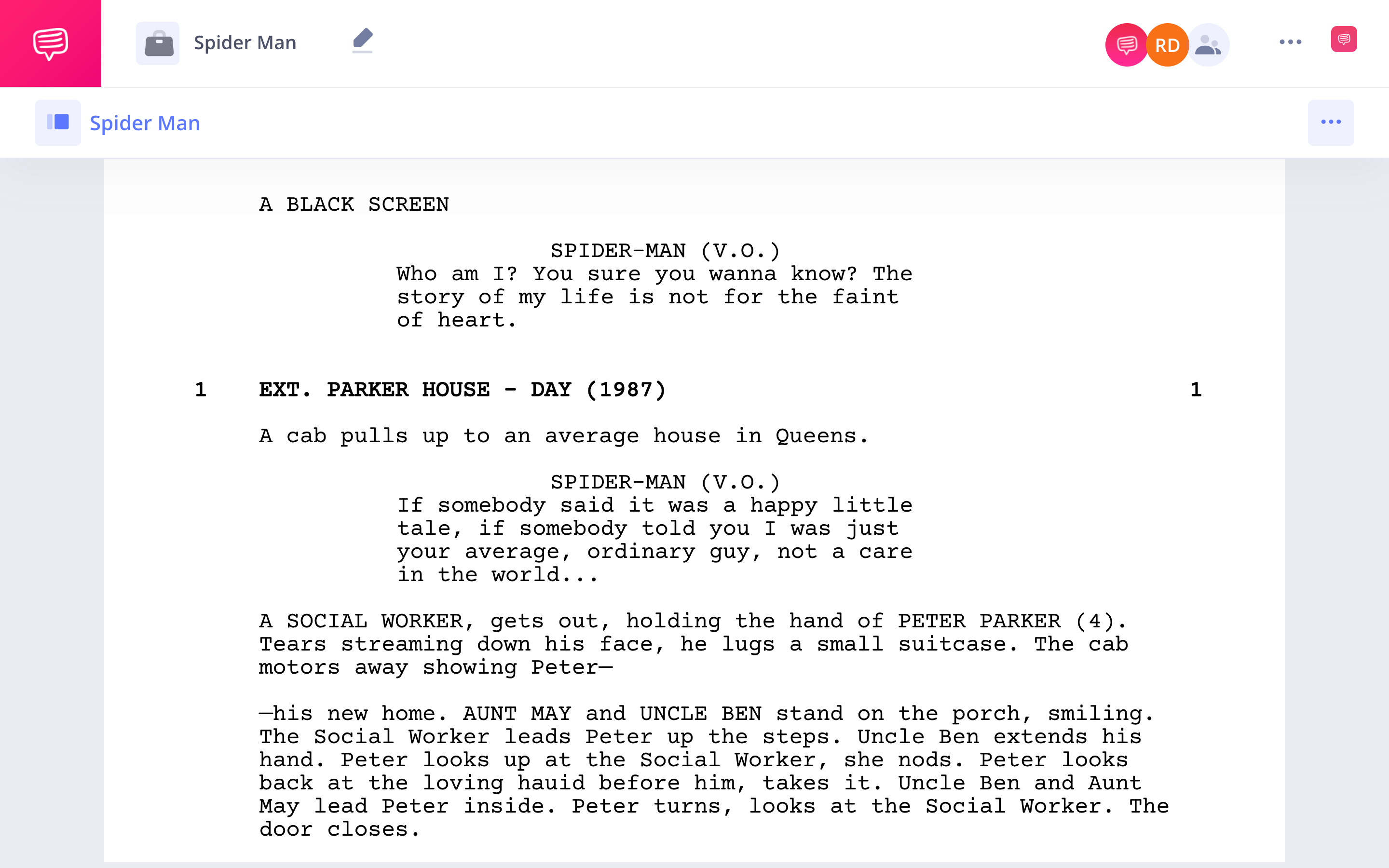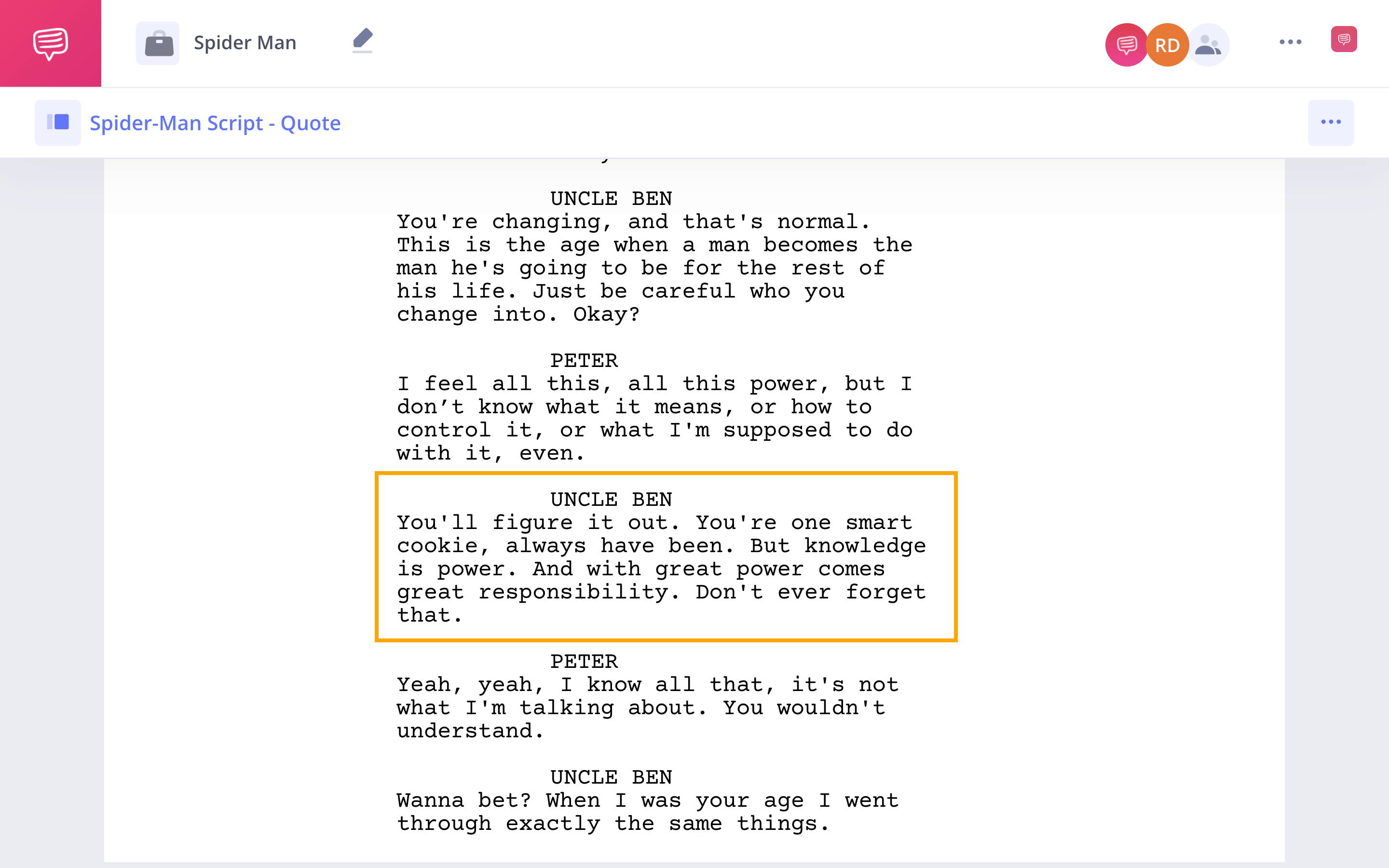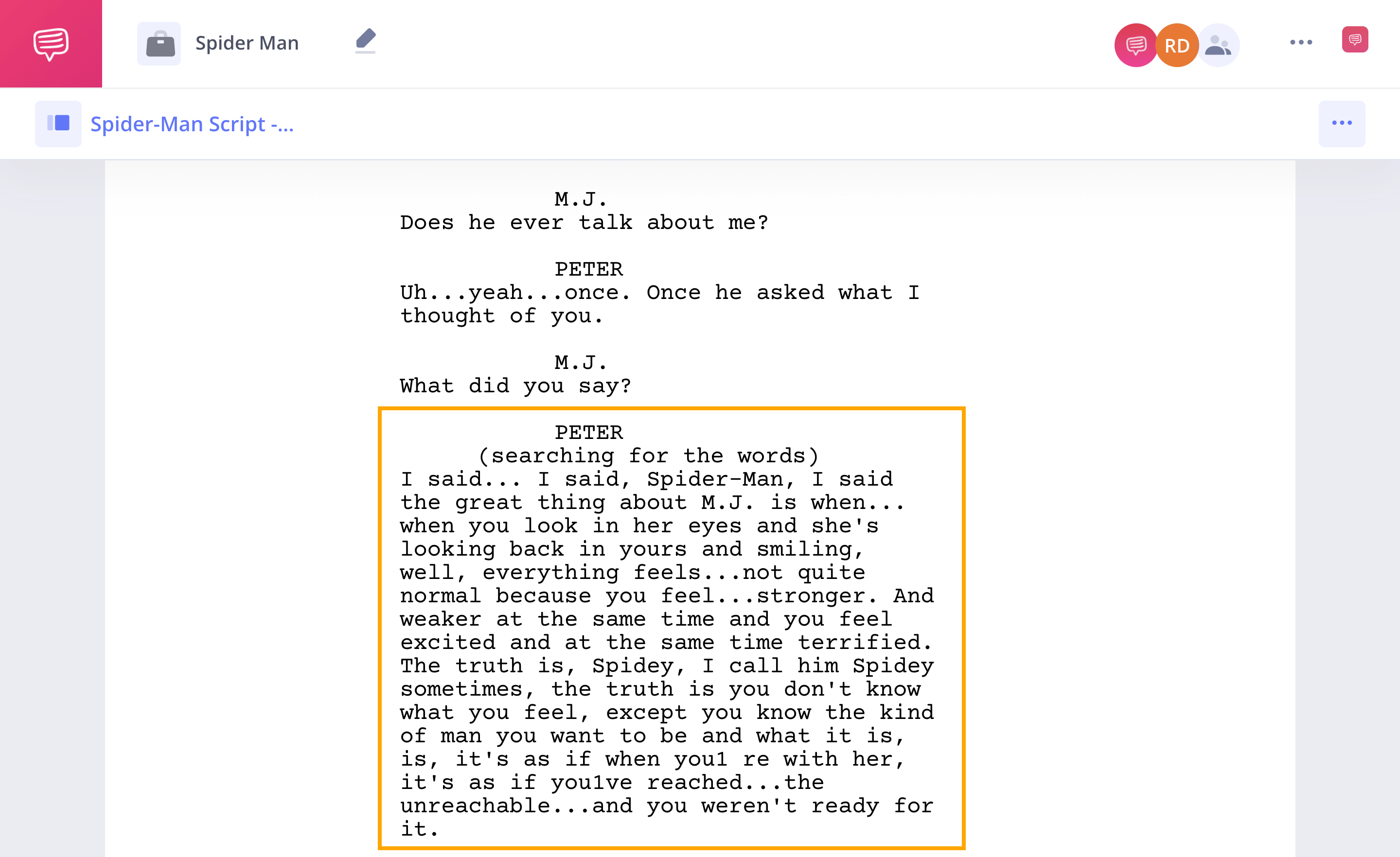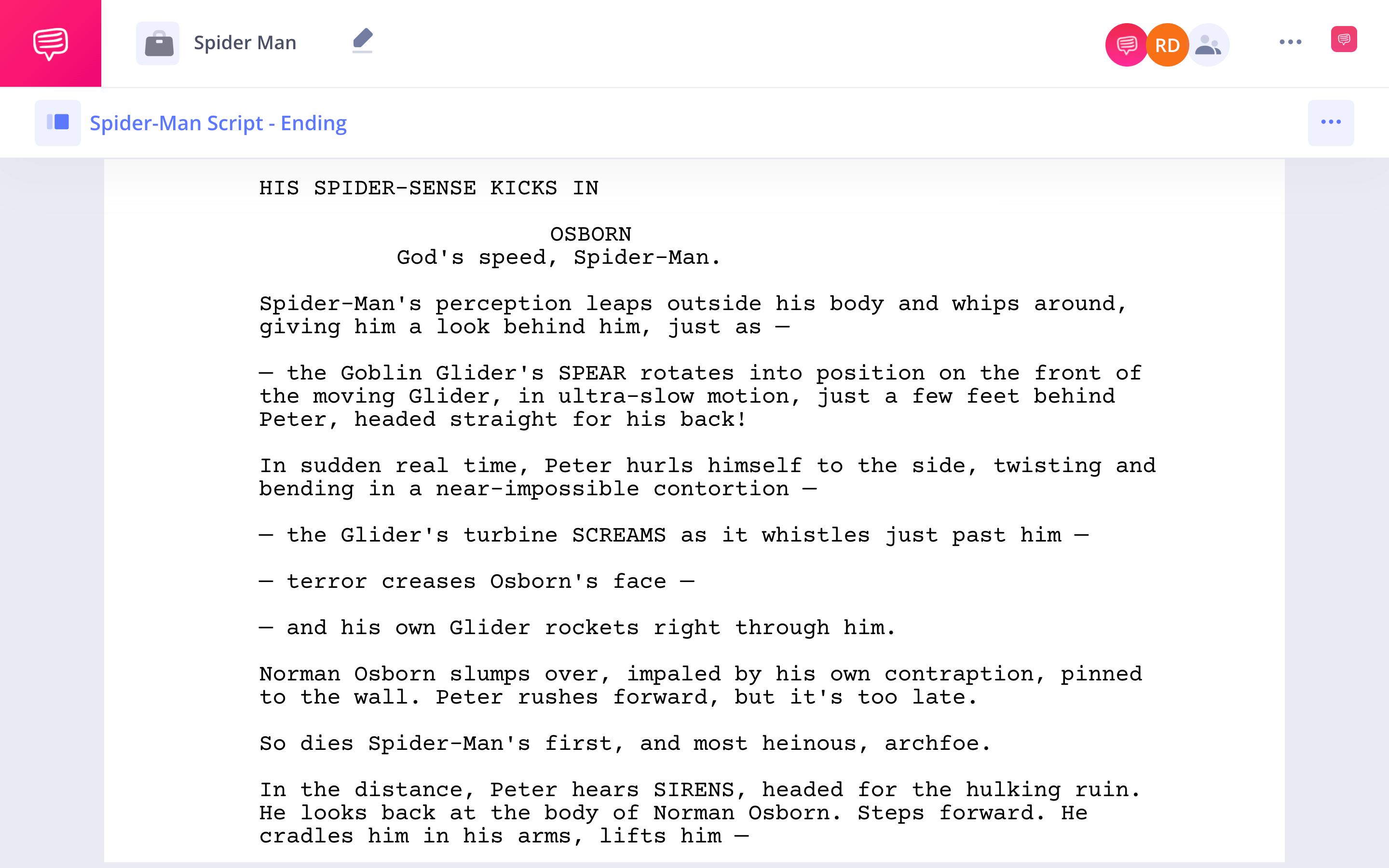Spider-Man is a monumental achievement in the superhero genre. The film kicked off one of the most successful franchises in cinema history, reinvigorated a beloved superhero long lost to the margins of culture, and celebrated a city recovering from a devastating tragedy. Spider-Man’s screenplay has become the platonic ideal for the hero’s origin story: hitting all the right beats at all the right moments in all the right ways. Let’s take a look at how the screenplay clicks.

WHO WROTE Spider-Man SCRIPT?
Written by David Koepp
David Koepp, the Spider Man writer, is the ninth most commercially successful screenwriter of all time. His screenplays include Jurassic Park, Mission: Impossible, War of the Worlds, Spider-Man, and Angels & Demons. He has also directed several films, such as Ghost Town, Mortdecai, and Secret Window.
STORY BREAKDOWN
STRUCTURE OF SPIDER-MAN 2002 SCREENPLAY
Here is the story structure for the Spider-Man 2002 script:
Exposition
A geeky Peter Parker runs to catch up to his school bus, which only stops because his crush, Mary Jane, tells the driver. Parker’s best friend, Harry Osborn, meets him at the field trip, after having an argument with his father, Norman.
Inciting Incident
On the field trip, Peter is bitten by a radioactive spider. He doesn’t think much of it.
Plot Point One
Peter realizes he has superpowers, and decides to make some money by entering into a wrestling tournament. He wins, but is ripped off, and so he lets a robber get away with the promoter’s money. The robber shoots his Uncle Ben, who was waiting for him outside.
Rising Action
Peter takes his Uncle’s advice by becoming a hero, stopping crime throughout the city. Meanwhile, Norman Osborn descends into madness after taking a supersoldier serum. He has become the Green Goblin.
Midpoint
The Green Goblin and Spider-Man collide for the first time at a fair. Spider-Man fends off the Goblin and saves multiple lives, including that of Mary Jane.
Plot Point Two
After a disastrous Thanksgiving dinner, Norman discovers Peter is Spider-Man. He then attacks Aunt May (as the Green Goblin), and Peter realizes the Goblin knows his identity.
Build Up
Norman, after finding out that Peter is in love with MJ, kidnaps her. He gives Peter a choice: save either a dangling trolley filled with people or MJ. Peter saves both.
Climax
Spider-Man and the Goblin have a final stand-off. Spider-Man dodges the Goblin’s glider, which then rams into the Goblin, killing him. Before he dies, Norman begs Peter not to tell Harry.
Finale
Peter, Harry, and MJ are at Norman’s funeral. Harry vows to find Spider-Man and get vengeance. MJ confesses her love to Peter, who rebukes her, since he doesn’t want her to be endangered. Spider-Man swings off into the sunset.
Spider-Man Script Takeaway #1
Spider Man quotes are iconic
The most famous quote to come out of the Spider Man screenplay is a testament to the power of a backstory for the superhero.
“With great power comes great responsibility” is a great line for a multitude of reasons. First, and most simply, it uses a parallel grammatical structure to have a memorable ring to it (“great...great”).
Second, it provides a guiding principle for Peter Parker’s alter ego, one which we see him not adhere to for the first portion of the film, only further emphasizing its importance once he does.
Finally, the “great power” line comes from a great character. Uncle Ben is only around for the first act of the Spider Man 1 screenplay. And yet he leaves an indelible imprint on the entire series because of how well he’s established. His relationship with Peter feels real: at points idyllic, at other points strained.
This means that once Ben dies, Peter and the audience are left with memories of a kind character who had a strong bond with Peter that wasn’t perfect.
One of the final scenes between Uncle Ben and Peter is a great example of this relationship. Let’s take a look at the conversation, which we imported into StudioBinder’s screenwriting software.
To read the entire scene, click the image link.
Spider Man 2002 quotes • Spider Man screenplay
This conversation occurs in Ben’s car, as he’s about to drop Peter off at the library (though Peter is actually headed to an underground wrestling match).
It’s undeniable that Peter is being a bit of a brat, while Ben is exuding a saintly patience. But it’s also undeniable that Peter sounds like just an ordinary teenager – what teen hasn’t had a conversation like this with a parental figure?
What makes the conversation unique is that the “changes” Peter is talking about aren’t normal teenage growing pains but rather mutations brought on by a radioactive spider.
But Spider-Man is so effective as a character because his origin story is also a coming-of-age. This is why Ben’s “great power” remark hits: he’s referring to Peter’s smarts, not his superpowers. In other words, he could say this to any teenager; it’s applicable not just to superheroes.
It’s Spider-Man’s appeal in a nutshell: unlike a, say, Superman or Iron Man, Spider-Man could be any one of us. He’s just a normal kid.
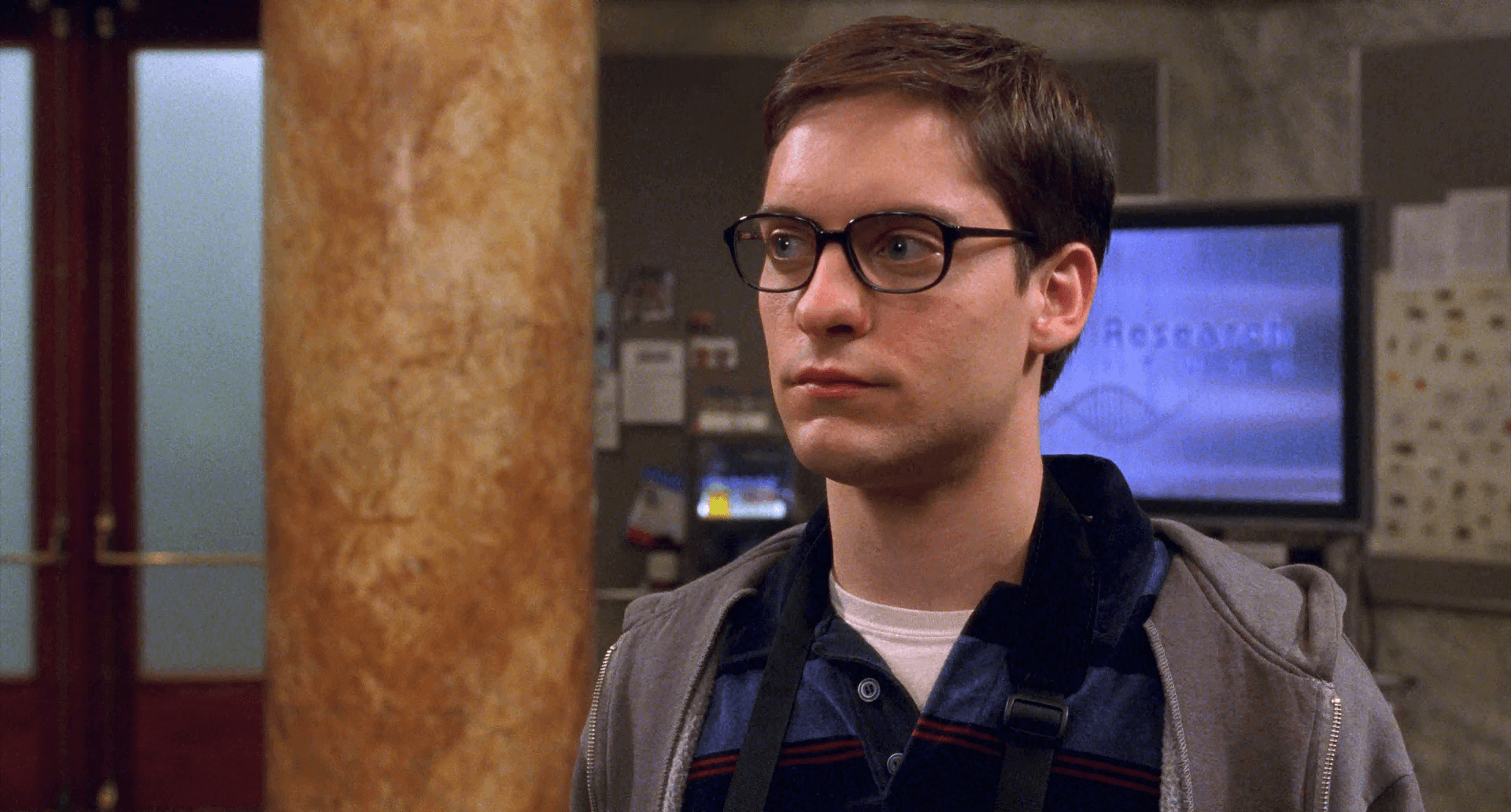
Spiderman script • Spider Man 2002 plot
The added pathos of the scene comes from the fact that this conversation will be Peter’s last with his uncle. As Aunt May says later, and as we already know from previous scenes, Peter loves his uncle and his uncle knows that, but in this conversation, Peter is being rebellious.
This makes the end of their conversation, Peter telling Uncle Ben to stop pretending to be his father, extra painful. Koepp hammers this home with some great stage direction: “There are some things you say that you wish you could pluck right back out of the air. This is one of them. And it’s too late.”
This type of writing is rare in a script, as it’s not necessarily action that we can see, but it works here because it tells the director and actors reading the pages that this is a massively important moment.
Koepp emphasizes the pain in the moment even more after Ben’s final line with “Peter wants to say something. But can’t.” Again, this is novelistic writing, but it manifests perfectly with a smart actor and director. Luckily, Spider-Man had both– take a look at how the conversation turned out:
Spider-Man 2002 script • Spider Man 2002 characters
Koepp, along with director Sam Raimi and actors Toby Maguire and Cliff Robertson, is setting up the regret that will haunt Peter for the rest of his life (A.K.A. the rest of the trilogy). It’s immensely relateable—we’ve all wished we said something differently at some point in our lives—and therefore all the more tragic.
“With great power comes great responsibility” isn’t the only great quote from the Spider Man 1 screenplay. A few more:
- “This is my gift, my curse. Who am I? I’m Spider-Man.” - Peter Parker
- “Go web! Fly! Up, up, and away web! Shazam! Go, go! Go, web, go! Tally ho!” - Peter Parker
- “The itsy bitsy spider climbed up the water spout. Down came the Goblin and took the spider out.” - Green Goblin
- “I trust my barber.” - J. Jonah Jameson
Spider-Man Script Takeaway #2
Spider Man characters’ romance
Part of what makes the Spider Man 1 screenplay remarkable is that it manages to juggle so many stories at once. It’s an origin story, it’s an arch-villain origin story, it’s a supervillain vs. alter ego cat-and-mouse, and it’s a love story.
The relationship between Peter and Mary Jane is not just a B story; it’s an iconic will-they-won’t-they romance.
What makes the audience so invested in the love story is that we know, from early on in the film, that both Peter and Mary Jane have a crush on each other. The only thing keeping them apart is, well, each other.
It’s a tale as old as time, and one which rivets us in real life as well as in film every time.
Peter’s relatability doesn’t end at his bratty teenager-ness. It carries over to his interactions with his crush, which are, to put it mildly, painfully awkward. It’s what makes us root for Peter; he’s the underdog, not some suave Lothario.
Peter’s inability to articulate his feelings to M.J. results in a multitude of scenes that play to a cringe-comedy effect. But the more powerful romance scenes are the ones that are played straight.
Let’s take a look at the conversation between Pete and M.J. that happens near the end of the film, after she confesses to Peter that she’s fallen in love with Spider-Man:
Spider-Man Script PDF • Spider Man 2002 characters
This would be a solid monologue if Peter had said it straight-up to Mary-Jane, though it might have hit the audience as slightly melodramatic.
What makes this monologue fantastic is that it’s Peter finally expressing himself to Mary Jane, but he’s doing it by recounting what he said to Spider-Man (who, of course, is… himself).
So while it’s slightly cathartic, it’s still also reserved – he’s not really saying this to Mary Jane. In fact, in theory, he’s just being a good wing-man, talking her up in front of Spider-Man.
Of course, Mary Jane knows this isn’t the case — she knows this is Peter opening up to her — and thus she reacts accordingly. Take note of Kirsten Dunst’s performance in the scene:
Spider Man 2002 full script • Spider man movie script
This is hitting her like a ton of bricks. Toby Maguire, too, plays it perfectly. He has that moment of vulnerability, and then when she asks, “you said that?”, he snaps out of it and plays it off.
It’s scenes like these that make the Peter-Mary Jane relationship so compelling. For almost the entirety of the first two films, they’re so close and yet so far. Tantalizing!
Spider-Man Script Takeaway #3
Spider-Man ending sticks the landing
Watching Spider-Man today, it’s striking how low the stakes are. In the age of Avengers, to have a supervillain who isn’t threatening to end humanity itself feels quaint.
This is part of what makes the villain of the Spider Man characters, the Green Goblin, so great. When the stakes are personal, they can be far more contained and affecting.
The Green Goblin isn’t some alien here for world domination; he’s the insecure dad of Pete’s best friend.
The Green Goblin’s close personal proximity to Peter complicates the narrative in a way that would be impossible had he just been an anonymous evil-doer.
If we look at the climax of the Spiderman script, we can see how David Koepp uses this relationship to heighten dramatic tension:
Spiderman script • Spider Man 2002 ending
Here, Peter has Osborn on the ropes. If he was an alien from some superplanet, the climax would be over, the job done. But Peter knows Osborn and has in fact looked up to him – Osborn saying that he’s been “like a father” to Peter doesn’t come out of nowhere. So it’s believable that Peter hesitates instead of immediately dealing a final blow.
This hesitation allows for suspense as we see Norman remotely operate his glider unbeknownst to Peter. We’re on the edge of our seats as two great actors get to interact on a personal level.
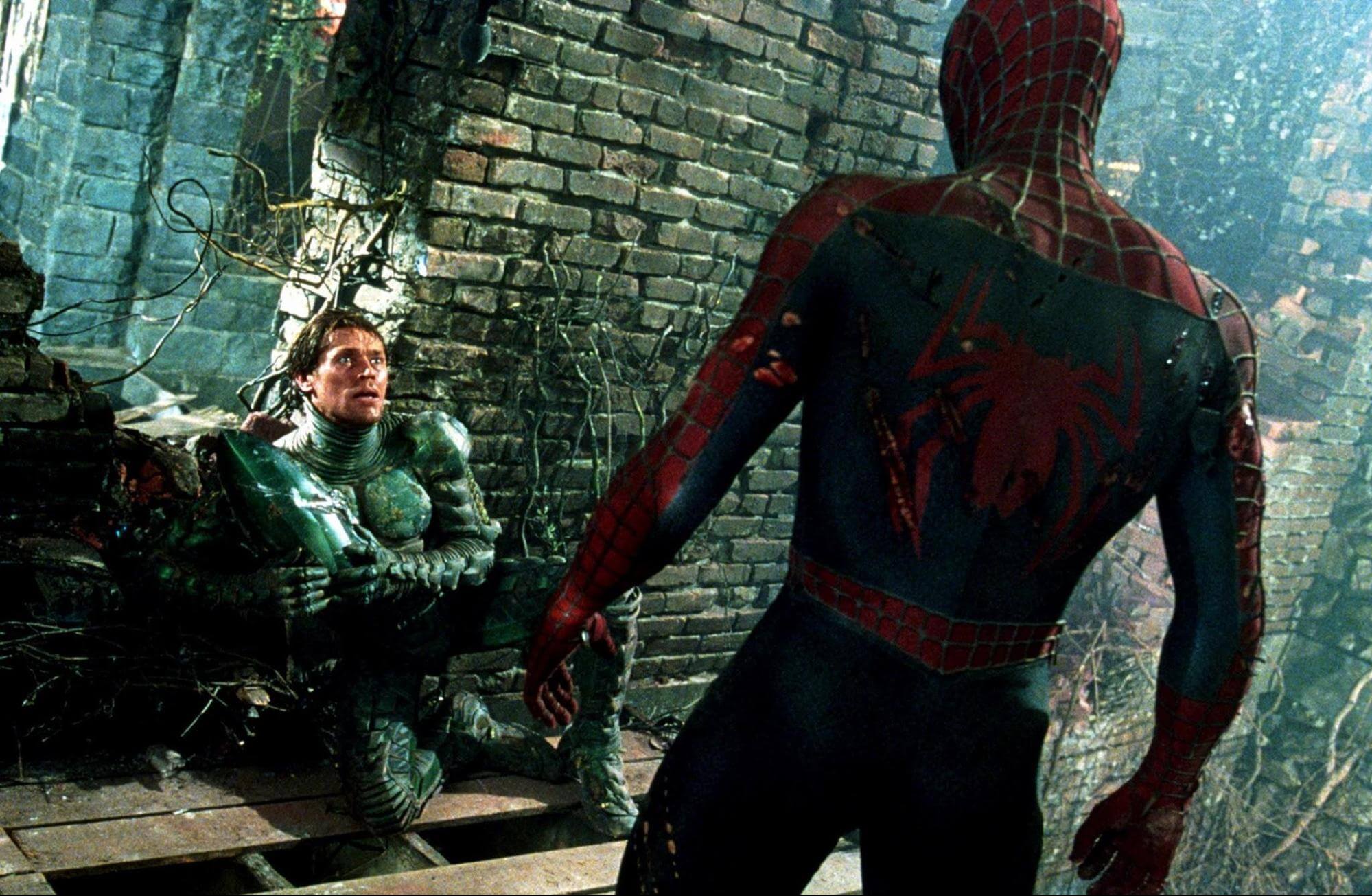
Spiderman script • What is Spider Man about?
Then, the final demise of Green Goblin is played perfectly, with Osborn “impaled by his own contraption.” It’s poetic: Norman became the Green Goblin by using one of his own contraptions on himself, and now with his own contraption he’s killed himself.
It also allows for Spider-Man’s hands to be clean (with great power comes great responsibility – Spider-Man can’t kill), though he still seems culpable, especially in the eyes of his best friend Harry, who will now be hell-bent on avenging his father’s death.
The Green Goblin doesn’t threaten to rule the world, and yet he’s an extremely powerful villain: he could destroy what we as an audience care about.
Related Posts
UP NEXT
Read and download more scripts
Spider-Man changed superhero movies forever. Now that you’re read our analysis of the Spider Man 1 ending, check out similar titles like The Dark Knight Rises, Joker, and Blade Runner 2049 in our screenplay database. Browse and download PDFs for all of our scripts as you read, write and practice your craft to become the next great screenwriter.
